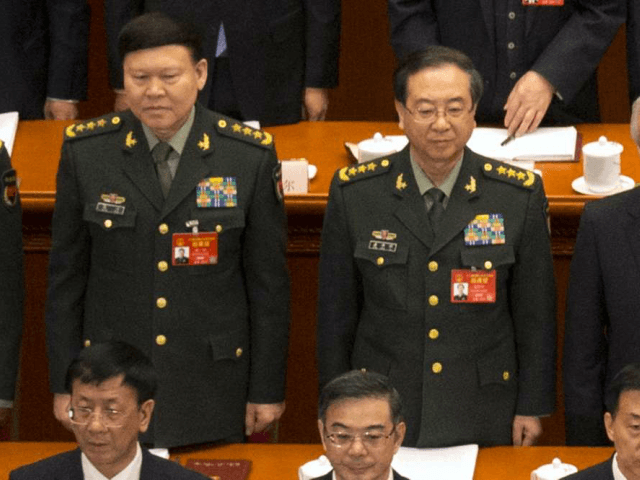China’s state-run media revealed on Tuesday that General Zhang Yang, formerly one of the most powerful military officials in the Communist nation, killed himself at his home in Beijing on November 23rd.
Zhang is one of the top officials who mysteriously disappeared from the public eye about a month before the recent Communist Party Congress began. There were rumors at the time that Zhang had been arrested for corruption, and might even be guilty of it.
The South China Morning Post reported on Tuesday that Zhang “had been linked to former disgraced CMC vice-chairmen Guo Boxiong and Xu Caihou, and was suspected of serious disciplinary violations—a euphemism for corruption.” Guo was sentenced to life in prison for graft, while Xu died of cancer while in custody in 2015. Zhang is alleged to have paid Guo millions of dollars’ worth of bribes.
According to Chinese media, Zhang was discovered to have “enormous property holdings of unknown origin.” He was said to be living at home while under investigation for corruption. He reportedly committed suicide by hanging himself.
China’s state media organs were not kind to his memory. The PLA Daily sneered that he “used such a shameful way to end his life,” having killed himself in a “bad move to escape punishment.” His lack of a “moral bottom line” was said to have “severely harmed the party’s image.”
Somehow the South China Morning Post found a source in Beijing who was willing to buck the party line by admitting Zhang and his colleague General Feng Fenghui, formerly chief of the general staff, were “brought down by an internal political struggle ahead of the five-yearly party congress.”
The New York Times claims that “suicides by top officials are almost unheard-of in China,” and portrays the Communist Party as deeply shaken by Zhang’s unexpected death, but later in the same piece, the Times notes that 243 officials have committed suicide since 2009, with the pace of convenient suicides picking up notably after Xi launched his drive against corruption in 2012. Zhang is believed to be the highest-ranking suicidal officer since the Cultural Revolution ended in 1976.
The South China Morning Post describes a rash of top officials killing themselves over the past few years, conveniently saving investigators a great deal of work, and sparing the Communist Party from hearing uncomfortable testimony:
In 2014, Vice Admiral Ma Faxiang, deputy political commissar of the PLA Navy, leapt from a building at a naval complex in Beijing. Ma’s death came less than three month after Rear Admiral Jiang Zhonghua, from the South Sea Fleet’s armaments department, plunged to his death from a hotel building in Zhoushan, Zhejiang province, while being questioned by military disciplinary inspectors.
At least 13,000 military officers have been investigated over the past five years, the PLA Daily reported last month, with Guo and Xu the most senior ones probed for buying and selling military ranks and other forms of corruption.
The New York Times also seems strangely confused about how Zhang’s death will impact President Xi Jinping’s anti-corruption crusade, even though it notes the wave of disgust expressed for Zhang by state-run media is a clear indication Xi intends to “press ahead with his crackdown, and perhaps even intensify it.”
The article quotes Steve Tsang of the University of Nottingham explaining that Xi would never back down after a suicide because that would imply his anti-corruption policy is wrong. Instead, the Chinese president is more likely to “argue that the campaign must be enforced even more rigorously to prevent traitors like General Zhang from escaping punishment.”
“The result may be a new era in party-Army relations that will instill obedience, but also fears within the P.L.A. leadership about who will be the next to go,” added Phillip C. Saunders of the Center for the Study of Chinese Military Affairs at the National Defense University in Washington.
General Zhang was seen as highly loyal to President Xi, and outspokenly critical of corrupt officials like Guo, but he is now unquestionably more useful to Xi Jinping dead, so he’s dead.

COMMENTS
Please let us know if you're having issues with commenting.